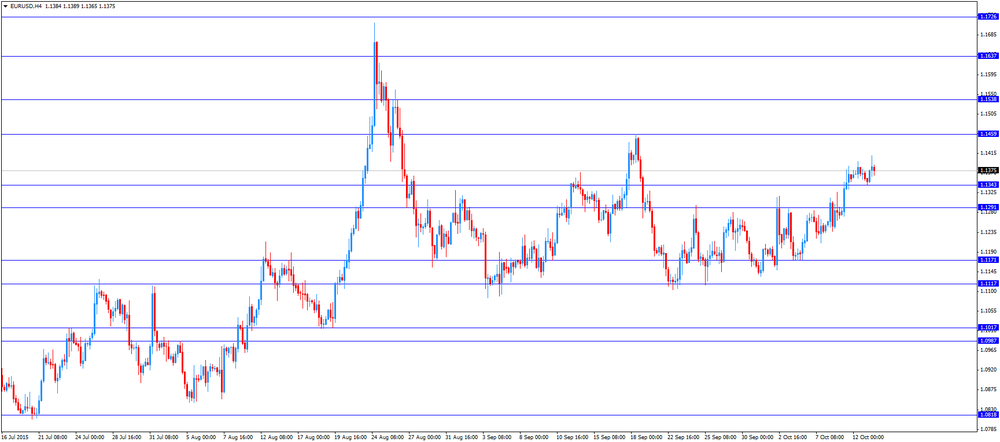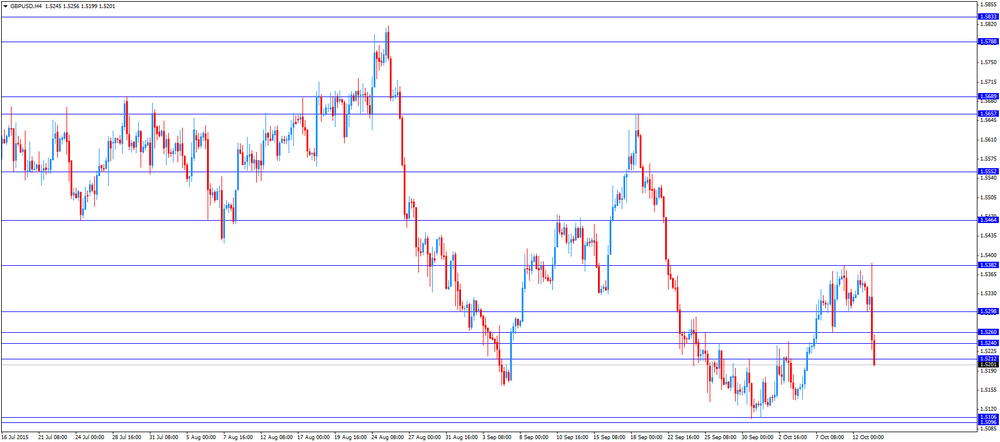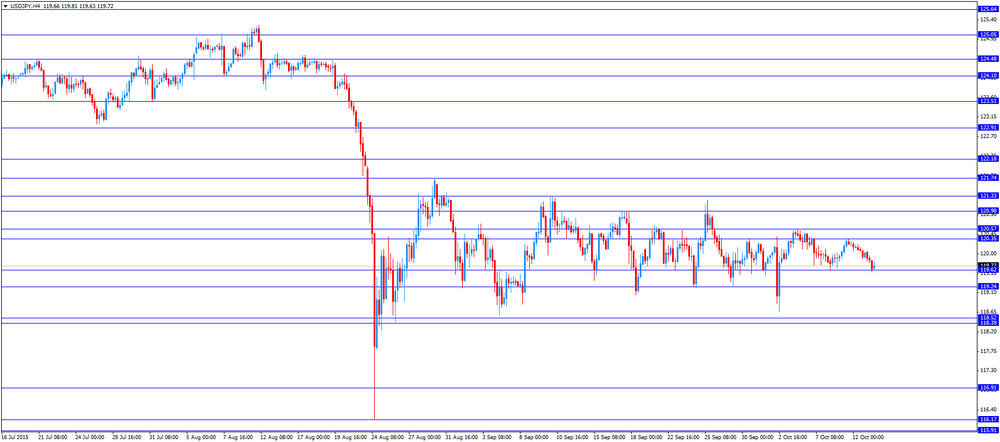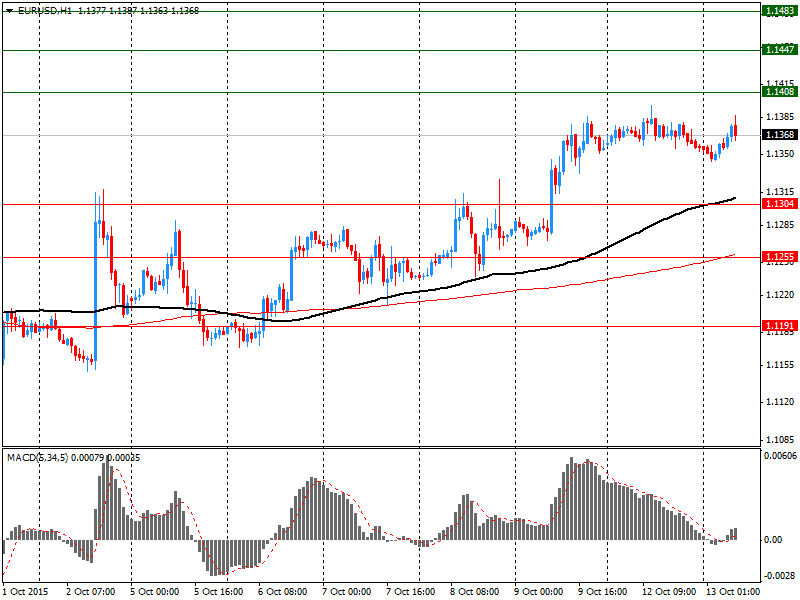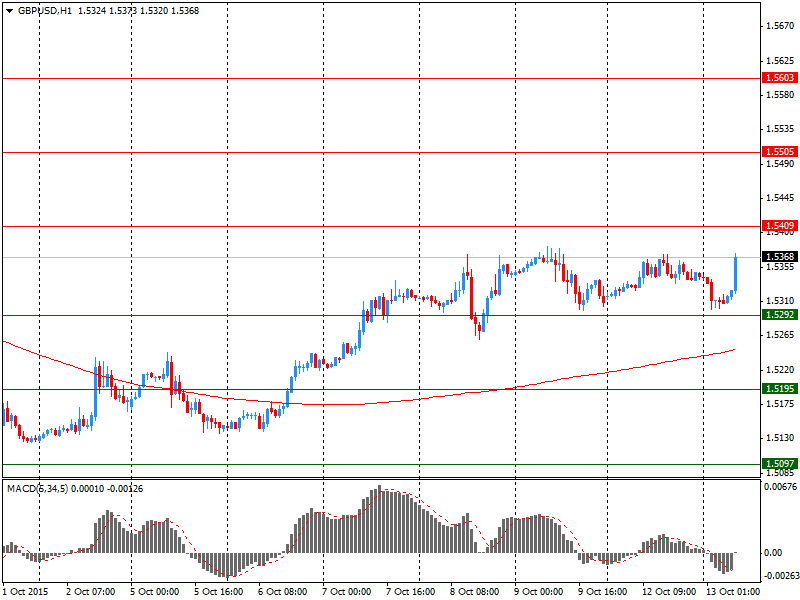Noticias del mercado
-
20:20
American focus: the US dollar was up against the commodity currencies
The US dollar rose against the commodity currencies and currencies of countries with emerging markets, as concerns over the global economic growth is currently reduced demand for riskier assets.
Disappointing data on foreign trade of China and a weak report on economic expectations in Germany has become a regular signals from the second and fourth, respectively, of the world economy of worsening prospects for global economic growth.
The weak data led to a decline recently increased the demand for more assets, which investors generally perceived as more risky, including equities, high yield bonds, commodity currencies and currencies of countries with emerging markets. Countries exporting primary commodities began to experience difficulties after China slowed the growth in demand for raw materials.
Recall, the Customs Administration of China reported that China's exports fell by 3.7% in September after declining 5.5% in August. Imports fell by 20.4% per annum after a reduction of 13.8% in August, while oil imports thus increased. It was the most significant rate of decline since June 2009, excluding the February distortion caused by the holiday season. Although exports fell by a smaller percentage than analysts had expected, this trend still threatens to undermine China's target for growth of about 7% this year. It is worth emphasizing, GDP data for the third quarter should come out next week.
As for data on Germany, at the Center for European Economic Research (ZEW) said that the level of economic confidence fell to an annual low in October. The index of investor confidence declined in October to 1.9 versus 12.1 in September. The last value is the lowest since October 2014, when the figure was -3.6. At the same time, the index of the current situation on October deteriorated. The corresponding index fell to 55.2 from 67.5 in September. The reading was the lowest since March 2015, when the index was at 55.1. "The scandal with the automaker Volkswagen and weak growth in emerging markets had a negative impact on the economic outlook for Germany, - said ZEW President Clemens Fyust. - Nevertheless, the performance of the domestic economy is still good, and the euro zone economy continues to recover. With this in mind, rather unlikely that the German economy will slide into recession. " We also learned that the indicator of economic sentiment in the euro area fell in October by 3.2 points to 30.1 points. Meanwhile, the current situation index fell 1.5 points to 11.2 points at the same time.
The pound has fallen more than 150 pips against the US dollar came under pressure of inflation data in Britain. The Office for National Statistics said that inflation in Britain unexpectedly turned negative in the last month, which was mainly due to a decrease in prices for fuel and clothing. According to the report, the consumer price index fell by 0.1 per annum in September. Experts expect that figure will remain unchanged. The last reading was the lowest since March 1960. Last week the Bank of England, said he did not expect that inflation will reach 1 percent until next spring. In view of this, economists are increasingly revising forecasts about the terms of the Central Bank rate hike. Also in today's report it reported that core consumer price index, which excludes changes in the value of energy, food, alcohol and tobacco, remained at 1.0 percent against 1.1 percent forecast. Prices of goods showed the largest annual decline in history (-2.4 percent), while inflation in the services sector accelerated to the highest since October 2014.
In focus were also statements by the new member of the Bank of England's MPC Gertjan Vlikhe. He noted that the risks to the economy of Britain remain bearish, but the exchange rate is "unreasonably high". He added that the next rate change soon "will be upward than decrease," adding that the effectiveness of QE has decreased over time.
-
17:22
Bank of England’s Monetary Policy Committee Member Ian McCafferty: the central bank should hike its interest rates to have room for interest rate cut in the event of a financial crisis
Bank of England's (BoE) Monetary Policy Committee (MPC) Member Ian McCafferty said on Tuesday that the central bank should hike its interest rates to have room for interest rate cut in the event of a financial crisis.
He said that low global inflation pressures could lead to the uncertainty for the economic outlook.
"Over the longer term, a number of more structural risks and uncertainties raise questions about the long term performance of the UK economy," McCafferty said.
McCafferty was only one member who voted to hike interest rate by 0.25% last week.
-
16:41
National Federation of Independent Business’s small-business optimism index for the U.S. increases to 96.1 in September
The National Federation of Independent Business (NFIB) released its small-business optimism index for the U.S. on Tuesday. The index increased to 96.1 in September from 95.9 in August.
7 of 10 subindexes rose last month, while three fell.
"Small business optimism continues to be stagnant, which is consistent with the expected economic growth of about 2.5 percent," NFIB Chief Economist Bill Dunkelberg said.
-
16:29
St. Louis Fed President James Bullard: the Fed should start raising its interest rates
St. Louis Fed President James Bullard said on Tuesday that the Fed should start raising its interest rates.
"Prudent monetary policy suggests gradually edging the policy settings closer to normal, since the goals have been met and policy would still remain very accommodative," he said.
Bullard pointed out that the U.S. economy remains supported even if the Fed will start raising its interest rates.
"Policy will remain exceptionally accommodative even as normalization proceeds, because policy settings are far from anything that could be called restrictive," St. Louis Fed president said.
He also said that he expects the unemployment rate in the U.S. to decline "into the 4% range", while inflation will rise.
-
15:50
Option expiries for today's 10:00 ET NY cut
EUR/USD: $1.1325(E440mn), $1.1400(E432mn), $1.1500(E253mn)
USD/JPY: Y118.50($326mn), Y119.50-55($250mn), Y120.00($296mn), Y120.22($480mn), Y120.50-60($966mn)
EUR/JPY: Y135.75(E523mn)
USD/CHF: Chf0.9475($250mn), Chf0.9800($220mn)
AUD/USD: $0.7250(A$550mn), $0.7350(A$575mn), $0.7500(A$400mn)
AUD/JPY: Y87.50(A$548mn)
-
14:46
Reuters reports the German government will downgrade its 2015 growth forecasts
Reuters reported on Tuesday that the German government will downgrade its 2015 growth forecasts to 1.7% from the previous estimate of a 1.8% rise, while 2016 growth forecast should remain unchanged at 1.8%, according to a senior government official.
Forecasts are expected to be announced on Wednesday.
-
14:22
Japan’s consumer confidence index declines to 40.6 in September
Japan's Cabinet Office released its consumer confidence index on Tuesday. The consumer confidence index declined to 40.6 in September from 41.7 in August.
The decline was driven by falls in all sub-indexes. The overall livelihood sub-index fell to 38.8 in September from 40.1 in August, the income growth sub-index was down to 39.4 from 39.9, the employment sub-index dropped to 44.9 from 46.3, while the willingness to buy durable goods sub-index decreased to 39.1 from 40.3.
-
14:14
Foreign exchange market. European session: the British pound traded lower against the U.S. dollar after the release of the weak U.K. inflation data
Economic calendar (GMT0):
(Time/ Region/ Event/ Period/ Previous/ Forecast/ Actual)
00:30 Australia National Australia Bank's Business Confidence September 1 5
01:00 China New Loans September 809.6 900 376.2
02:00 China Trade Balance, bln September 60.24 46.79 59.43
05:00 Japan Consumer Confidence September 41.7 40.6
06:00 Germany CPI, m/m (Finally) September 0.0% -0.2% -0.2%
06:00 Germany CPI, y/y (Finally) September 0.2% 0% 0%
06:00 Japan Prelim Machine Tool Orders, y/y September -16.5% -19.1%
07:15 Switzerland Producer & Import Prices, y/y September -6.8% -6.8%
07:15 Switzerland Producer & Import Prices, m/m September -0.7% -0.1%
08:30 United Kingdom BOE Credit Conditions Survey
08:30 United Kingdom Retail Price Index, m/m September 0.5% 0.1% -0.1%
08:30 United Kingdom Retail prices, Y/Y September 1.1% 1% 0.8%
08:30 United Kingdom Producer Price Index - Input (MoM) September -3% Revised From -2.4% 0.4% 0.6%
08:30 United Kingdom Producer Price Index - Input (YoY) September -14.6% Revised From -13.8% -12.9% -13.3%
08:30 United Kingdom Producer Price Index - Output (MoM) September -0.5% Revised From -0.4% -0.1% -0.1%
08:30 United Kingdom Producer Price Index - Output (YoY) September -1.9% Revised From -1.8% -1.8% -1.8%
08:30 United Kingdom HICP, m/m September 0.2% 0% -0.1%
08:30 United Kingdom HICP, Y/Y September 0.0% 0% -0.1%
08:30 United Kingdom HICP ex EFAT, Y/Y September 1.0% 1.1% 1.0%
09:00 Eurozone ZEW Economic Sentiment October 33.3 30.1
09:00 Germany ZEW Survey - Economic Sentiment October 12.1 6 1.9
The U.S. dollar traded mixed to lower against the most major currencies in the absence of any major economic reports from the U.S.
The euro traded mixed against the U.S. dollar after the release of the negative economic data from the Eurozone. The ZEW Center for European Economic Research released its economic sentiment index for Germany and the Eurozone on Tuesday. Germany's ZEW economic sentiment index dropped to 1.9 in October from 12.1 in September, missing expectations for a fall to 6.0.
"The exhaust gas scandal of Volkswagen and the weak growth of emerging markets has dampened economic outlook for Germany. However, the performance of the domestic economy is still good and the Euro area economy continues to recover. This makes it rather unlikely that the German economy will slide into recession," the ZEW President Clemens Fuest.
Eurozone's ZEW economic sentiment index decreased to 30.1 in October from 33.3 in September.
The British pound traded lower against the U.S. dollar after the release of the weak U.K. inflation data. The Office for National Statistics (ONS) released the consumer price inflation data for the U.K. on Tuesday. The U.K. consumer price index declined to -0.1% in September from 0.0% in August, missing expectations for a flat reading.
The decline was driven by low petrol and clothing prices.
"The largest downward contribution came from petrol, with prices falling by 3.7 pence per litre between August and September this year compared with a fall of 0.8 pence per litre between the same 2 months a year ago. Diesel prices are now at their lowest level since December 2009, standing at 110.2 pence per litre," the ONS said.
On a monthly basis, U.K. consumer prices fell 0.1% in September, missing expectations for a flat reading, after a 0.2% rise in August.
Consumer price inflation excluding food, energy, alcohol and tobacco prices remained unchanged at 1.0% in September, missing forecasts of a rise to 1.1%.
The consumer price inflation is below the Bank of England's 2% target.
The U.K. house price index rose at a seasonally adjusted rate of 0.7% in August, faster than a 0.8% in July.
On a yearly basis, the U.K. house price index increased at a seasonally adjusted rate of 5.2% in July, same as in July. It was the lowest rise since September 2013.
The lower house price inflation was mainly driven by a decline in prices in the East and the South East.
The Swiss franc traded mixed against the U.S. dollar after the weak producer and import prices data from Switzerland. The Federal Statistical Office released its producer and import prices data on Tuesday. Switzerland's producer and import prices fell 0.1% in September, after a 0.7% drop in August.
The decline was mainly driven by lower prices for crude petroleum and fuel products.
The Import Price Index decreased by 0.2% in September, while producer prices were flat.
On a yearly basis, producer and import prices plunged 6.8% in September, after a 6.8% drop in August. It was the biggest drop since April 1950.
The Import Price Index fell by 11.2% year-on year in September, while producer prices dropped 4.8%.
EUR/USD: the currency pair traded mixed
GBP/USD: the currency pair fell to $1.5199
USD/JPY: the currency pair declined to Y119.59
The most important news that are expected (GMT0):
18:00 U.S. Federal budget September -64.4 95
23:30 Australia Westpac Consumer Confidence October -5.6% 3%
-
14:00
Orders
EUR/USD
Offers 1.1400 1.1425-30 1.1450 1.1475 1.1500 1.1520 1.1535 1.1550
Bids 1.1375-80 1.1355-60 1.1330 1.1300 1.1285 1.1270 1.1250 1.1230 1.1200
GBP/USD
Offers 1.5400-10 1.5425-30 1.5450 1.5480 1.5500-10 1.5530 1.5550
Bids 1.5350 1.5320-25 1.5300 1.5280 1.5255-60 1.5240 1.5220 1.5200
EUR/GBP
Offers 0.7425-30 0.7450-60 0.7475-80 0.7500 0.7530 0.7550
Bids 0.7400 0.7385-90 0.7365 0.7350 0.7330-35 0.7300 0.7285 0.7265 0.7250
EUR/JPY
Offers 136.75 137.00 137.25 137.50 137.80 138.00 138.30 138.50
Bids 136.35 136.20 136.00 135.80 135.50 135.25 135.00 134
USD/JPY
Offers 119.85-90 120.00 120.20 120.35 120.50 120.65 120.85 121.00
Bids 119.65 119.50 119.25 119.10 119.00 118.85 118.50
AUD/USD
Offers 0.7220-25 0.7250-60 0.7375 0.7400 0.7425 0.7450
Bids 0.7300 0.7275 0.7260 0.7230 0.7200 0.7185 0.7150
-
11:52
UK house price inflation rises 0.7% in August
The Office for National Statistics (ONS) released its house inflation data for the U.K. on Tuesday. The U.K. house price index rose at a seasonally adjusted rate of 0.7% in August, faster than a 0.8% in July.
On a yearly basis, the U.K. house price index increased at a seasonally adjusted rate of 5.2% in July, same as in July. It was the lowest rise since September 2013.
The lower house price inflation was mainly driven by a decline in prices in the East and the South East.
The average mix-adjusted house price was £284,000 in August, up from £282,000 in July.
-
11:39
Switzerland's producer and import prices fall 0.1% in September
The Federal Statistical Office released its producer and import prices data on Tuesday. Switzerland's producer and import prices fell 0.1% in September, after a 0.7% drop in August.
The decline was mainly driven by lower prices for crude petroleum and fuel products.
The Import Price Index decreased by 0.2% in September, while producer prices were flat.
On a yearly basis, producer and import prices plunged 6.8% in September, after a 6.8% drop in August. It was the biggest drop since April 1950.
The Import Price Index fell by 11.2% year-on year in September, while producer prices dropped 4.8%.
-
11:28
German wholesale prices fall 0.6% in September
The German statistical office Destatis released its wholesale prices for Germany on Tuesday. German wholesale prices fell 0.6% in September, after a 0.8% decrease in August.
On a yearly basis, wholesale prices in Germany dropped 1.8% in September, after a 1.1% decline in August. Wholesale prices have been declining since July 2013.
The fall was mainly driven by a 3.1% decline in the wholesale prices of solid fuels and related products.
-
11:23
German final consumer price inflation declines 0.2% in September
Destatis released its final consumer price data for Germany on Tuesday. German final consumer price index declined 0.2% in September, in line with the preliminary estimate, after a flat reading in August.
On a yearly basis, German final consumer price index fell to 0.0% in September from 0.2% in August, in line with the preliminary estimate.
The decline was driven by falling energy prices, which dropped 9.3% year-on-year in September.
Food prices climbed 1.1% year-on-year in September.
-
11:18
Fed Governor Lael Brainard: the Fed should delay its interest rate hike until it is clear that developments abroad do not have a negative effect on the recovery of the U.S. economy
Fed Governor Lael Brainard said on Monday that the Fed should delay its interest rate hike until it is clear that developments abroad do not have a negative effect on the recovery of the U.S. economy.
"I view the risks to the economic outlook as tilted to the downside. The downside risks make a strong case for continuing to carefully nurture the U.S. recovery - and argue against prematurely taking away the support that has been so critical to its vitality," she said.
-
11:14
Germany's ZEW economic sentiment index drops to 1.9 in October
The ZEW Center for European Economic Research released its economic sentiment index for Germany and the Eurozone on Tuesday. Germany's ZEW economic sentiment index dropped to 1.9 in October from 12.1 in September, missing expectations for a fall to 6.0.
The assessment of the current situation in Germany fell by 12.3 points to 55.2 points in October.
"The exhaust gas scandal of Volkswagen and the weak growth of emerging markets has dampened economic outlook for Germany. However, the performance of the domestic economy is still good and the Euro area economy continues to recover. This makes it rather unlikely that the German economy will slide into recession," the ZEW President Clemens Fuest.
Eurozone's ZEW economic sentiment index decreased to 30.1 in October from 33.3 in September.
The assessment of the current situation in the Eurozone declined by 1.5 points to -11.2 points in October.
-
11:07
UK consumer price inflation is down to -0.1% in September
The Office for National Statistics (ONS) released the consumer price inflation data for the U.K. on Tuesday. The U.K. consumer price index declined to -0.1% in September from 0.0% in August, missing expectations for a flat reading.
The decline was driven by low petrol and clothing prices.
"The largest downward contribution came from petrol, with prices falling by 3.7 pence per litre between August and September this year compared with a fall of 0.8 pence per litre between the same 2 months a year ago. Diesel prices are now at their lowest level since December 2009, standing at 110.2 pence per litre," the ONS said.
On a monthly basis, U.K. consumer prices fell 0.1% in September, missing expectations for a flat reading, after a 0.2% rise in August.
Consumer price inflation excluding food, energy, alcohol and tobacco prices remained unchanged at 1.0% in September, missing forecasts of a rise to 1.1%.
The Retail Prices Index dropped to 0.8% in September from 1.1% in August, missing expectations for a decrease to 1.0%.
The consumer price inflation is below the Bank of England's 2% target.
-
11:00
Germany: ZEW Survey - Economic Sentiment, October 1.9 (forecast 6)
-
11:00
Eurozone: ZEW Economic Sentiment, October 30.1
-
10:55
National Australia Bank’s business confidence index climbs to 5 points in September
The National Australia Bank (NAB) released its business confidence index for Australia on Tuesday. The index climbed to 5 points in September from 1 points in August. August's reading was lowest level since mid-2013.
The industry welcomed Malcolm Turnbull's replacement of Tony Abbott as Australian prime minister.
"It is not clear to what extent this reflects the change in leadership of the Liberal Party, as solid business conditions and some dissipation of financial market jitters may have also contributed to the result," the NAB said.
The main business conditions index remained unchanged at 9 points in September, while employment rose to 4 points in from -1 points.
-
10:48
China's trade surplus falls to 59.43 billion in September
The Chinese Customs Office released its trade data on Tuesday. China's trade surplus declined to $59.43 billion in September from $60.24 billion in August, beating expectations for a decline to a surplus of $46.79 billion.
Exports fell at an annual rate of 3.7% in September, while Imports slid at an annual rate of 20.4%, the eleventh consecutive decline.
-
10:36
China's Finance Minister Lou Jiwei: now is not the right time to raise interest rates in the U.S.
China's Finance Minister Lou Jiwei said in an interview published in the China Business News on Monday that now is not the right time to raise interest rates in the U.S.
"The United States isn't at the point of raising interest rates yet and under its global responsibilities it can't raise rates," he said.
Jiwei added that the U.S. "should assume global responsibilities" because of the U.S. dollar's status as a global currency.
The finance minister pointed out the slowdown in the global economy was caused by "weak recovery of developed countries".
"Developed countries should now have faster recoveries to give developing countries some external demand," he added.
Jiwei noted that the slowdown in the Chinese economy is a healthy process.
-
10:30
United Kingdom: Producer Price Index - Input (MoM), September 0.6% (forecast 0.4%)
-
10:30
United Kingdom: Producer Price Index - Input (YoY) , September -13.3% (forecast -12.9%)
-
10:30
United Kingdom: Producer Price Index - Output (MoM), September -0.1% (forecast -0.1%)
-
10:30
United Kingdom: HICP, Y/Y, September -0.1% (forecast 0%)
-
10:30
United Kingdom: HICP, m/m, September -0.1% (forecast 0%)
-
10:30
United Kingdom: Producer Price Index - Output (YoY) , September -1.8% (forecast -1.8%)
-
10:30
United Kingdom: Retail prices, Y/Y, September 0.8% (forecast 1%)
-
10:30
United Kingdom: Retail Price Index, m/m, September -0.1% (forecast 0.1%)
-
10:30
United Kingdom: HICP ex EFAT, Y/Y, September 1.0% (forecast 1.1%)
-
10:22
Bank of Japan’s September monetary policy meeting minutes: exports and production are affected by the slowdown in emerging economies
The Bank of Japan (BoJ) released its September monetary policy meeting minutes on late Monday evening. According to minutes, the country's economy continued to recover moderately but exports and production were affected by the slowdown in emerging economies.
Many board members expect the inflation in Japan to rise.
"On the price front, the year-on-year rate of increase in the consumer price index (CPI, all items less fresh food) is about 0 percent. Inflation expectations appear to be rising on the whole from a somewhat longer-term perspective," the minutes said.
There are downside risks to the recovery in Japan from developments in emerging and commodity-driven economies as well as the debt problem and the momentum of economic activity and prices in Europe and the pace of recovery in the US. Economy, the minutes said.
Minutes showed that the central bank wants to continue its monetary policy until the 2% inflation target will be reached, and it will adjust its monetary policy if needed.
The BoJ decided to keep unchanged its monetary policy at its September meeting.
-
10:12
U.K. leading economic index rises 0.2% in August
The Conference Board (CB) released its leading economic index for the U.K. on Monday. The leading economic index increased 0.2% in August, after a 0.2% decline in July.
The coincident index was up 0.2% in August, after a 0.1% rise in July.
"The current behaviour of the composite indexes suggests that the economy is likely to continue to grow into early next year, but the pace is unlikely to pick up," the CB said.
-
09:15
Switzerland: Producer & Import Prices, y/y, September -6.8%
-
08:35
Options levels on tuesday, October 13, 2015:
EUR / USD
Resistance levels (open interest**, contracts)
$1.1483 (2373)
$1.1447 (1329)
$1.1408 (734)
Price at time of writing this review: $1.1368
Support levels (open interest**, contracts):
$1.1304 (511)
$1.1255 (2428)
$1.1191 (2280)
Comments:
- Overall open interest on the CALL options with the expiration date November, 6 is 32336 contracts, with the maximum number of contracts with strike price $1,1500 (3664);
- Overall open interest on the PUT options with the expiration date November, 6 is 42599 contracts, with the maximum number of contracts with strike price $1,1200 (4648);
- The ratio of PUT/CALL was 1.32 versus 1.32 from the previous trading day according to data from October, 12
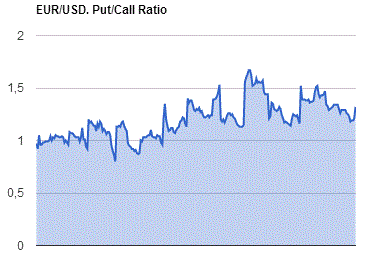
GBP/USD
Resistance levels (open interest**, contracts)
$1.5603 (441)
$1.5505 (1670)
$1.5409 (1136)
Price at time of writing this review: $1.5368
Support levels (open interest**, contracts):
$1.5292 (1489)
$1.5195 (2146)
$1.5097 (1359)
Comments:
- Overall open interest on the CALL options with the expiration date November, 6 is 15741 contracts, with the maximum number of contracts with strike price $1,5350 (2441);
- Overall open interest on the PUT options with the expiration date November, 6 is 15861 contracts, with the maximum number of contracts with strike price $1,5200 (2146);
- The ratio of PUT/CALL was 1.00 versus 1.00 from the previous trading day according to data from October, 12
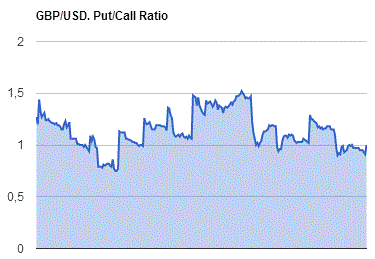
* - The Chicago Mercantile Exchange bulletin (CME) is used for the calculation.
** - Open interest takes into account the total number of option contracts that are open at the moment.
-
08:02
Japan: Prelim Machine Tool Orders, y/y , September -19.1%
-
08:01
Germany: CPI, m/m, September -0.2% (forecast -0.2%)
-
08:01
Germany: CPI, y/y , September 1.8% (forecast 0%)
-
08:01
Germany: CPI, m/m, September -0.2% (forecast -0.2%)
-
07:00
Japan: Consumer Confidence, September 40.6
-
04:04
China: Trade Balance, bln, September 59.43 (forecast 46.79)
-
04:03
China: New Loans, September 376.2 (forecast 900)
-
02:31
Australia: National Australia Bank's Business Confidence, September 5
-
00:30
Currencies. Daily history for Oct 12’2015:
(pare/closed(GMT +3)/change, %)
EUR/USD $1,1357 +0,01%
GBP/USD $1,5343 +0,22%
USD/CHF Chf0,9624 +0,10%
USD/JPY Y120,04 -0,17%
EUR/JPY Y136,32 -0,23%
GBP/JPY Y184,16 -0,06%
AUD/USD $0,7360 +0,35%
NZD/USD $0,6710 +0,24%
USD/CAD C$1,3000 +0,43%
-
